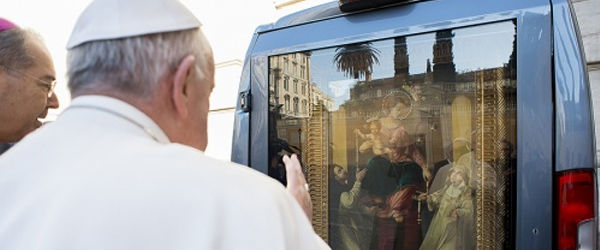It boggles the mind to contemplate 21 million people ensnared in human trafficking and modern-day slavery in 2013.But widespread awareness of forced labor in the United States and other countries is the critical first step to abolishing the heinous practice, according to speakers at a Sept. 26 New York forum on corporate responsibility and faith-based investment.More than 250 people heard government and industry representatives and a trafficking survivor at an event sponsored by the Interfaith Center on Corporate Responsibility.The Interfaith Center on Corporate Responsibility is a coalition of 300 faith- and values-based shareholder groups who use their investments to influence corporate policies promoting justice and sustainability. The event, "Breaking the Bonds: Modern-Day Strategies to Counter Modern-Day Slavery," was the group's annual fundraiser.The "abysmal practices" of forced labor, bonded labor and human trafficking are often hard to see because the perpetrators are skilled at keeping victims hidden and silent, said Steven Greenhouse, labor reporter for The New York Times, who moderated the panel. He said 5 million of the trafficked or enslaved people are children."The exploitation of persons for sexual purposes has become the third largest illegal 'business' after drugs and arms trafficking," according to the interfaith group's annual report for 2012-13.Human trafficking happens at the intersection of official jurisdiction for human rights, labor standards, transnational organized crime, gender and ethnicity concerns, said Luis CdeBaca. He is the ambassador-at-large in the State Department's Office to Monitor and Combat Trafficking in Persons."Right at the center where they overlap, you create a zone of impunity, where no one" is in charge," he said. "You can get someone into an exploitative situation in 36 hours."Human trafficking is not well known, even among religious communities and nonprofit organizations that might be prepared to help victims, said Susan Stern, chair of the President's Advisory Council on Faith-based and Neighborhood Initiatives. "We need to raise awareness. Once you know about it, it's very hard to ignore," she said.Stern said trafficking is directly related to poverty, and "77 percent of kids trafficked in New York came through the foster care system. This is a huge systemic problem," she said."It's a high-profit, low-risk business. The penalties for human trafficking are lower than for drug trafficking," she said. "We need to switch the paradigm and make it high-risk, low-profit.""It's a high-profit, low-risk business. The penalties for human trafficking are lower than for drug trafficking. We need to switch the paradigm and make it high-risk, low-profit."—Susan Stern, Advisory Council on Faith-based and Neighborhood Initiativesetty Ashworth characterized it as a $34 billion industry. Ashworth is the general manager for Global Diversity for Delta Airlines."It doesn't compute in our heads that this could go on in our neighborhoods, but it does," Stern said.CdeBaca said law enforcement officials may overlook telltale signs of trafficking in the mistaken expectation that victims will come forward on their own. Inspectors at a factory could identify traffickers and victims by asking workers if they have access to their passports and if the boss routinely selects "girlfriends" from among the workers on the factory floor, he said.Ima Matul, a survivor and organizer with the Coalition to Abolish Slavery and Trafficking in Los Angeles, said her experience as a trafficked teenager mirrors that of other victims. She came to the United States from Indonesia at 17 to work as a nanny, with the promise of transportation, a salary and reasonable working conditions. She soon learned her "labor recruiter" was a trafficker and her employer.Matul's workday stretched to 18 hours, seven days a week and she was never paid. The trafficker gave her notes saying how much Matul would get when she returned to Indonesia. Each month, the $150 wage was reduced by fees the trafficker assessed for broken glassware or improperly cleaned items."It was ridiculous," Matul said, "and there was always the threat that she would have me arrested. In our country we don't trust the police, so of course I didn't go out into the street."With no money and no contacts, Matul endured growing physical and verbal abuse. After three years, she struggled to write a letter to the nanny next door to ask for help. Because of her limited English, "It took me months to write the sentences and more months to get the courage to give it to her," Matul said. The nanny connected her to the coalition for which she now works.Speakers at the forum said awareness, education and intervention are necessary to eradicate trafficking and other forms of enslavement. CdeBaca said the U.S. government uses a three-pronged approach to human trafficking: prevention, protection and prosecution.Stern said her group recommended the government increase visibility of the issue, measure the resources required to eradicate modern day slavery in the United States and overseas, and create a global fund to combat the issue, akin to successful initiatives against AIDS and tuberculosis. Stern said faith leaders can help identify victims and match them with services. Panelists said individuals, corporations and organizations must look closely at sources of the goods and services they buy. Slavery exists throughout the supply chain. "Goods get cheaper because wages get cheaper. As churches and synagogues, we have a responsibility to look where things come from," Stern said.Ashworth said Delta Airlines trains employees to identify potential trafficking and works with government agencies to follow up on suspected cases.—CNS

